Add a mobile app to your online web store, and it’s likely to increase your business profit and build a more loyal audience. Talking from experience, we can say that after the pandemic, mobile app companies saw significantly more requests for the development of e-commerce mobile apps. Entrepreneurs are looking for ways to normalize their situations, enter new markets, and find ways to engage customers. Among these opportunities stands e-commerce app development. Done right, a mobile app can become a valuable business asset to expand your e-commerce presence for years ahead.
Contents:
Benefits of mobile apps for e-commerce
As the name suggests, an e-commerce mobile application is a digital product created for enhancing the shopping experience on mobile devices. Statista tells us that by 2024, the number of US smartphone users who make purchases via mobile devices is forecast to exceed 187 million:
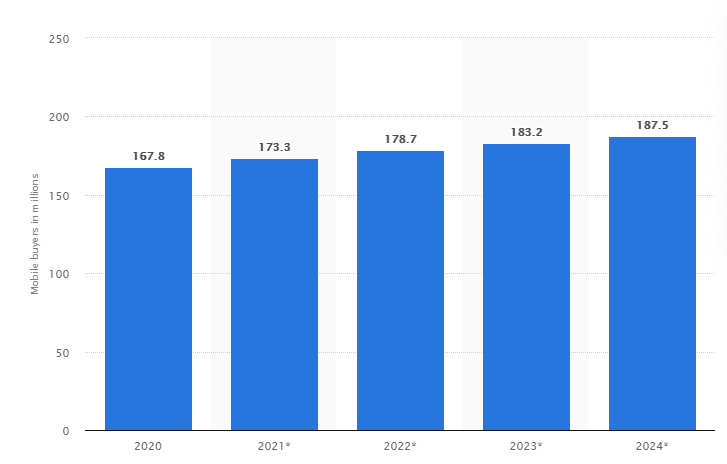
While the majority still choose to buy on desktops, 40% of those who prefer mobile apps for e-commerce is still a massive figure that keeps on rising. What’s more, the majority of consumers would first use their smartphones to check available offers no matter where they choose to close their deals, owing to the simple convenience.
Progressive smartphone penetration and the availability of quality mobile internet services lead to a situation when it’s hard to find a large retailer that doesn’t have a mobile app. There’s room for everything: food, clothes, medicine, books, household appliances, electronics. With the development of technologies, most offline stores have either completely switched to virtual or have a presence there. Not just large firms, but small businesses also enjoy the benefits of mobile apps as part of their e-commerce strategies.
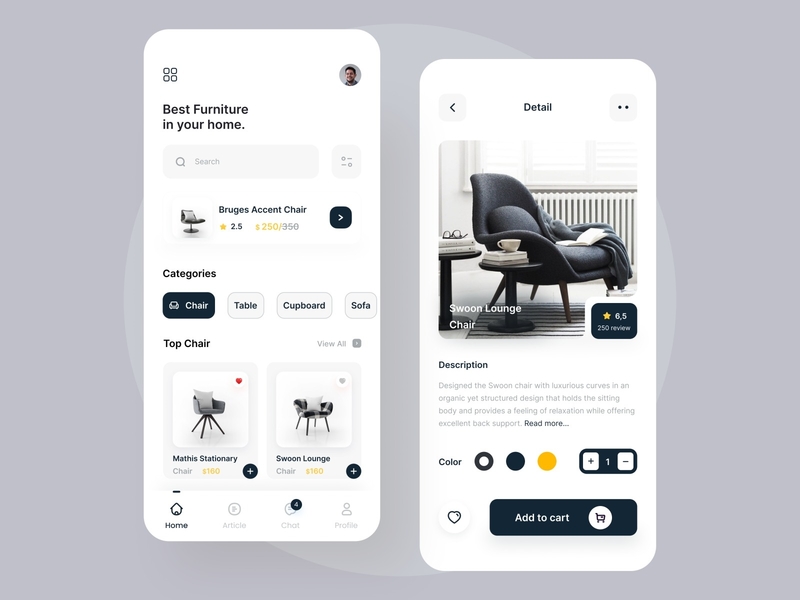
Furniture Shop App by Andri.
Online trading holds no place for backward-looking. If you don’t adapt and attract users, your brand will get lost compared to other, more active competitors. Online shopping of all kinds can take advantage of introducing a mobile app into their business processes. Unlike responsive or even mobile versions of online websites, a mobile application is an independent sales channel that adapts to each customer and has many other advantages:
- Convenience. More than simply having the ability to buy a product anytime, anywhere, consumers tend to prefer to do it in dedicated mobile apps. A well-thought-out design that feels natural and smooth, speed, and ease of browsing explain why 85% of users prefer mobile apps to websites.
- Push notifications. This is an underlying reason why the majority of business owners decide to create an e-commerce app. With the help of personalized messages, they can send information about promotions, sales, and new products, and can even communicate with a specific user or a group of users. Notifications work wonders in terms of remarketing, as long as they are done right. To avoid people deleting your app because of its intrusiveness, let them set preferences on how often they wish to receive messages and in what cases.
- Customer retention. There are other ways to make your customers return more often apart from push notifications. Mobile applications are better suited for loyalty programs and conducting unique promotions for regular customers.
- Increased sales. Studies show that consumers are more willing to shop in mobile apps. Conversion rates are 3 times higher there as compared to websites. So if your aim is more sales, it looks like you can put e-commerce app development services to good use.
- Integration with social networks and messengers. Consumers love to show off new purchases to their close ones. Using a mobile app, they are able to do this with the help of sharing buttons. This way new customers come to you without any advertising costs on your part.
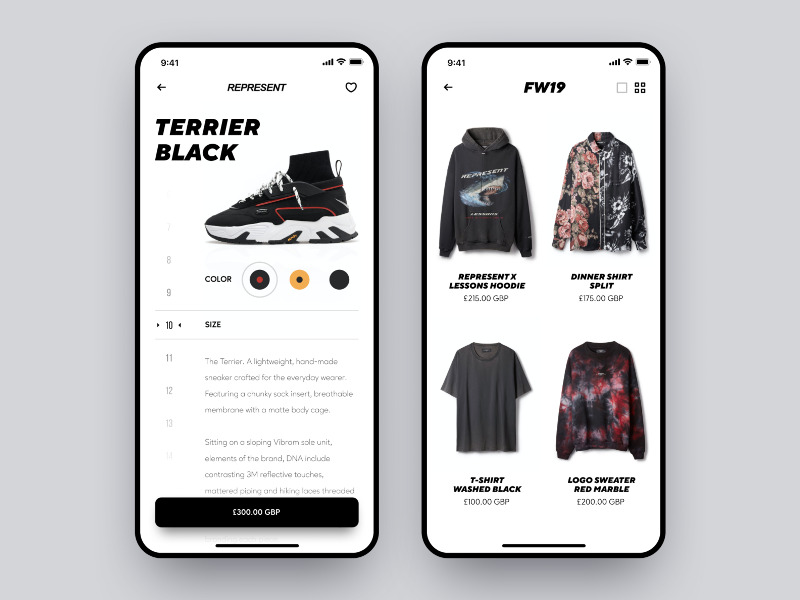
Represent App Concept by Shakuro
E-commerce mobile app market and top ten e-commerce mobile apps
Mobile e-commerce is one of the fastest-growing areas of online commerce, with dedicated mobile applications included. The main factors that seem to push its development further are:
- The convenience and ubiquity of mobile payments.
- Implementation of 4G and 5G standards.
- Availability of mobile internet.
According to analysts, the future of mobile commerce looks quite bright with possible shortcomings being eliminated as a matter of time, thanks to the development of technologies. Today the prospects for the development of m-commerce are much more positive than 5 years ago. Spurred by the pandemic, 2020 became the biggest mobile shopping year to date. eMarketer estimates that worldwide e-commerce will approach $5 trillion by the end of 2021 and reach $6 trillion by 2024. Among the categories seeing the fastest e-commerce growths are food and beverage, health, personal care, and beauty.
More to the point, in 2022, customers worldwide spent a total of 109 billion hours on mobile shopping apps. It grew 45% year over year.
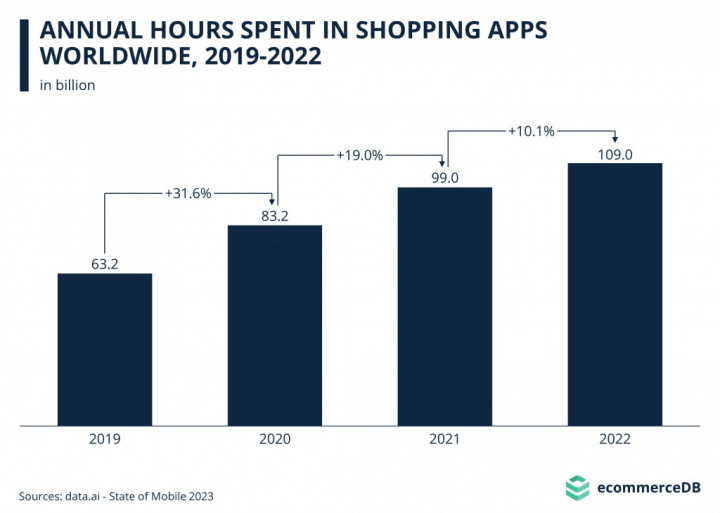
In addition, while we can largely contribute this phenomenon to the global pandemics, multiple surveys and researchers show that for many consumers the switch from shopping in physical shops to smartphone apps might be permanent.
As for the most popular e-commerce mobile apps, AppFigures has the information on that:
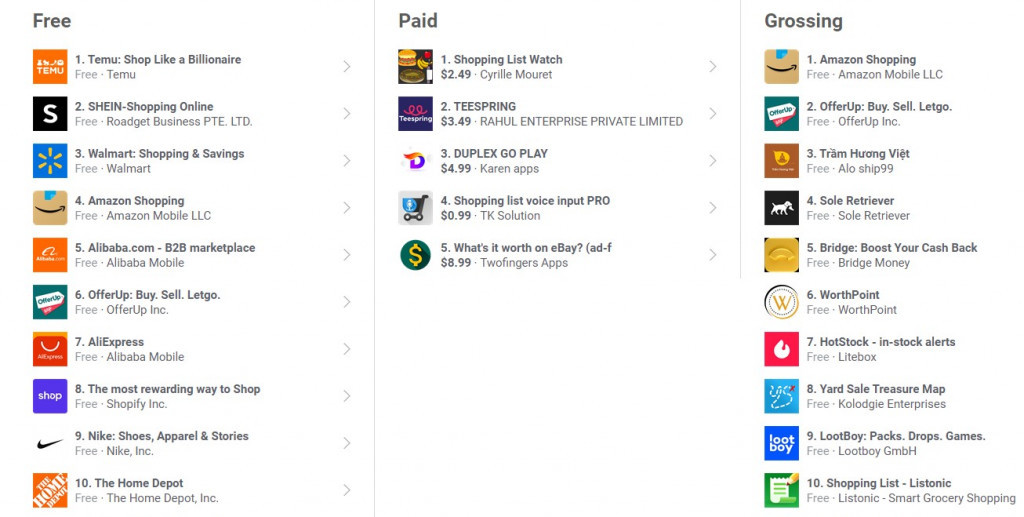
Features of e-commerce mobile apps
You can divide the functionality of any e-commerce application into basic and advanced features. By basic ones, we understand everything that makes an app work and lets a user make a purchase, such as:
- Registration
- Personal account
- Product catalog
- Search
- Cart
- Checkout.
These might be enough for an MVP of your product. Later on, though, you’ll need to introduce extra features (whether killer or not) to distinguish you from the competitors. It might be anything that today’s users like and that makes them buy like recommendations and reviews, or gamification features. The limit is your imagination, the specifics of a business model, and the changing market realities.
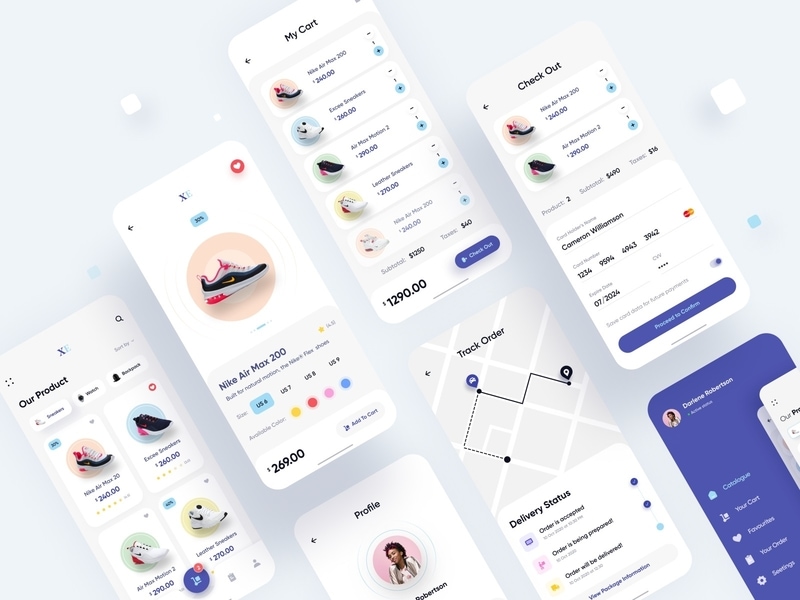
E-commerce Mobile App by Shah Alam
Think about:
- Custom look and feel, consistent with the rest of your branding. It’s good for brand recognition and connecting with customers.
- A more powerful and advanced search.
- A more convenient cart functionality, as well as the ability to compare products.
- A loyalty program that retains customers through bonuses, discounts, and gifts.
- Product videos, including 360 degrees.
- Ability to choose a currency. How about letting your users pay with crypto?
- Leveraging AR functionality. E-commerce is one of those industries where you can deploy it to its full potential.
- AI: product recommendations, chatbots, voice support.
- Push messages, advanced support, and marketing analytics.
- Wish lists.
- Shopping by photos.
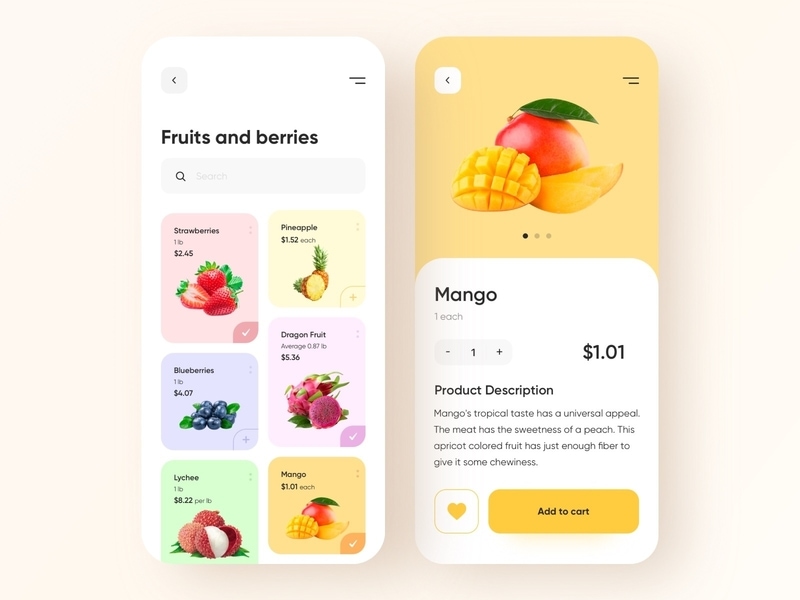
Food shop – Mobile App by Anastasia
E-commerce tech stack. Mobile app or responsive website?
A difficult choice stands before any person who thinks about developing an e-commerce mobile app for their business, with the scope of work that might this venture involve almost always unclear.
The first question is whether you need a dedicated native mobile application at all or whether should you rest with a responsive website that you probably have already. The general rule is that a mobile app as a separate asset in the case of e-commerce makes sense if your customers make purchases from your store on a regular basis. For example, take a pet shop store. Same as with human food, people usually buy things for their pets regularly and in small amounts and are open to a solution that can let them do it faster, easier, and cheaper.
Mobile apps have a higher engagement rate than mobile-optimized websites thanks to specific abilities and tools that you cannot use on responsive mobile sites. So if such a store has a convenient mobile application that provides useful push notifications about certain brands and products, faster checkout, and a loyalty program, it’s a good option. From providing customized offers and updates to user engagement monitoring, an app is a great option to test different marketing approaches and tactics that will ultimately lead to higher conversion rates.
However, if your customers make use of your services every few months only, they are not likely to install an app for fear of cluttering their phones too much. This choice also depends on the characteristics of the target audience and the specifics of your business, so a thorough marketing analysis is needed. Thus, younger people are more likely to appreciate the introduction of a mobile app:
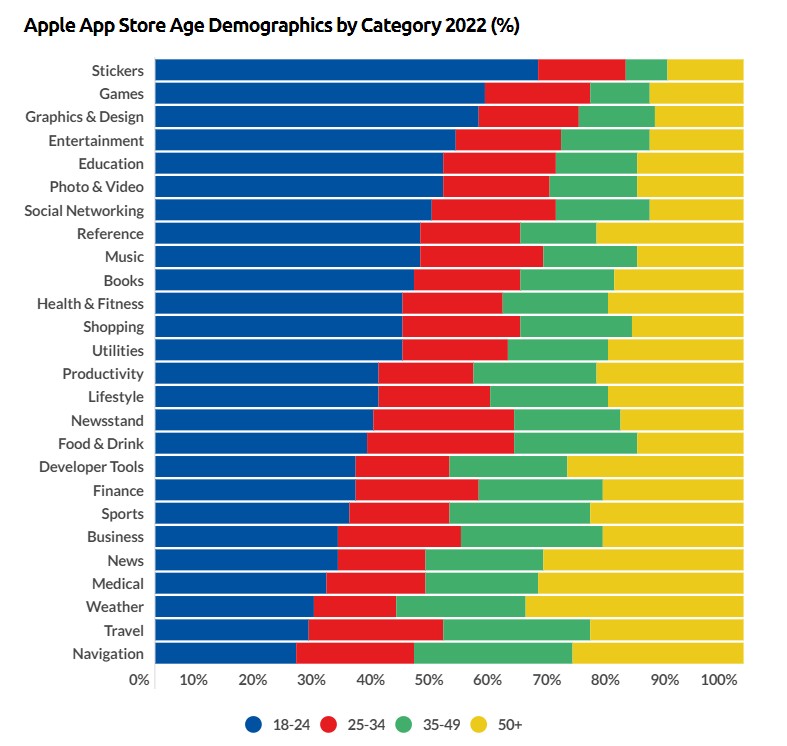
If the analysis shows that a native mobile app is a promising option for you, there rises a choice between iOS and Android and other technologies like hybrid apps.
The iOS/Android issue lies in the business specifics and the target audience. Various surveys estimate that a typical iPhone user has a 30-40% greater income than an Android one. So the average purchase check of an iPhone owner is considerably greater. On the other hand, Android has the advantage of being the world’s leading mobile operating system. So, by ignoring users of one of the platforms, stores lose profits. Therefore, large retailers have both Android and iOS applications. But a young business can start with one thing to enter the market and attract buyers with the second platform coming in as the whole thing develops further.
There are also other options for mobile e-commerce app development like Progressive Web Apps which is a kind of web technology and hybrid apps that combine the features of web and native mobile approaches. These options are not equal to native apps and lack some of their features that may or may not be essential to your app. However, depending on what you need, it can be a suitable option for you. Any e-commerce mobile app development company is ready to provide you with useful insights if you’re not clear on your priorities.
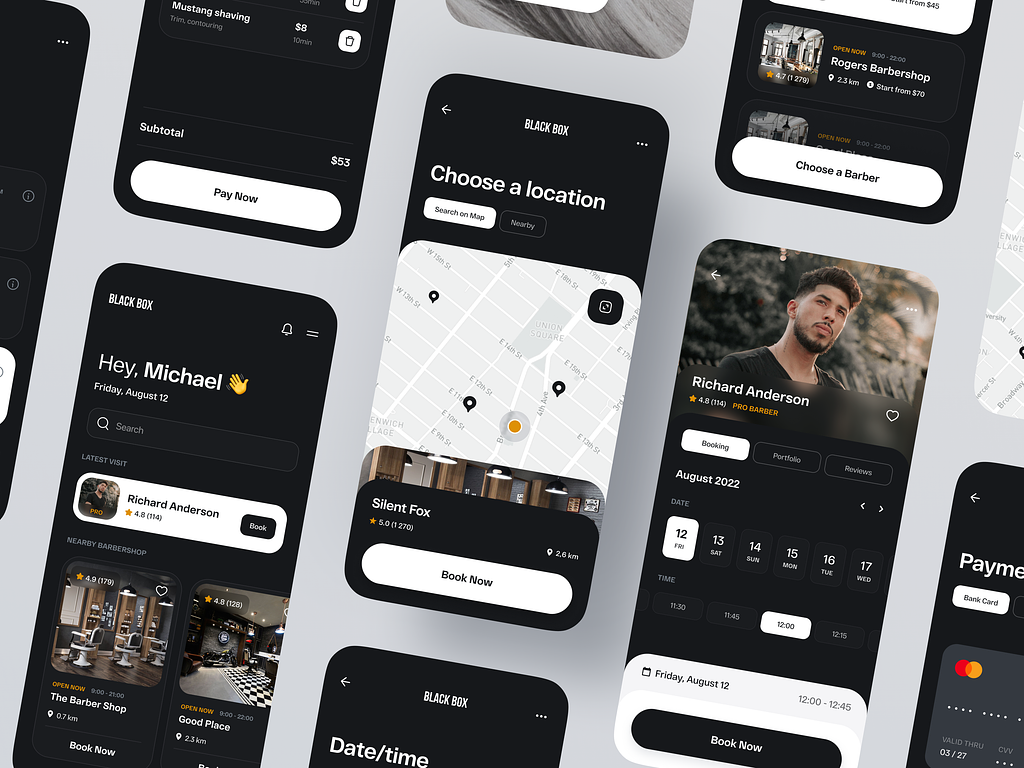
Barber Booking Mobile App by Conceptzilla
E-commerce mobile app design
The main challenge for designers of e-commerce mobile apps is to ensure that users can make purchases without thinking about what to do next. You need an intuitive interface, personalization, loyalty programs, and checkout in a few clicks to turn the act of purchasing into a reflex. In other words, it involves pretty much the same as in the case of designing an e-commerce website. It usually relies heavily on the use of white space to avoid distracting users from products, paying attention to visual hierarchy, planning a sales funnel, and aiming for the fastest checkout process possible.
Thoughtful design speeds up the user’s intention to purchase. The result of human/application interaction depends on whether designers managed to understand the psychology of users.
The work of the design department consists of several stages:
- Discovery, when we find out the specifics of a particular business, market situation, or competitors, and put ourselves in the shoes of the prospective users to understand how to better interact with the app.
- Wireframing is the creation of the application’s backbone, a clear structure that holds the design elements together.
- Prototyping is the creation of a clickable prototype that is approved by the client.
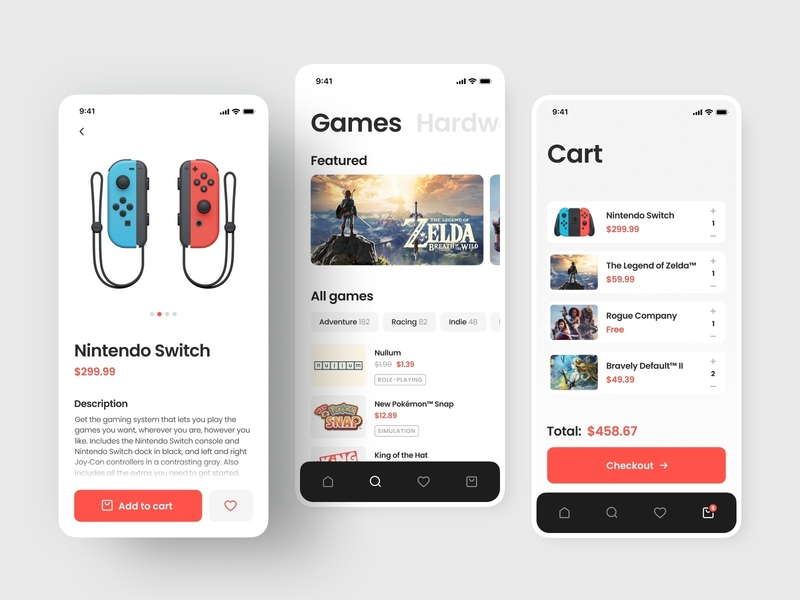
Nintendo eShop App by Shakuro
E-commerce mobile app trends
AR and VR
Augmented and virtual realities are transforming the e-commerce industry. After the Year-Of-Remote consumers are more than ready to embrace the new design trends and the convenience provided by the virtual technologies that bridge the gap between the physical and virtual worlds. If they can’t or don’t want to visit your physical store (or you don’t have any), why not let them experience your products embedded in the environment around them?
Gamification
Gamification means introducing game-design elements and principles into non-game-related environments, e-commerce processes in our case. Mobile games are the number one category on both App Store and Google Play, so combining their allure with commerce seems to be a valid idea. According to the latest report by App Annie, leading brands have been busy creating interactive experiences for their buyers, either in their own apps or partnering with developers of popular mobile games. For example, Louis Vuitton’s in-game skins for League of Legends proved to be a popular item and elevated its brand visibility.
AI
Artificial Intelligence has the potential to transform the user experience and improve various aspects of e-commerce applications. For instance, you can analyze user behavior, purchase history, and preferences to deliver personalized product recommendations and offers. What’s more, with AI-powered chatbots and virtual assistants you can reduce the load on your customer support team and provide real-time help 24/7, answering common questions, resolving issues, and guiding clients through the shopping process.
How much it costs to develop an e-commerce app
Every person who reaches us with a request about e-commerce app development wants to know how much it would cost to develop their app. Experience shows us that the difference between seemingly the same product could be up several times less or more depending on the contractor and the development process. The cost of app development depends on several factors with the main one being who will actually do the job:
- You yourself
- A freelancer
- An app development company (that can be in-house or outsourced).
If you’re not sure about your capabilities, the next step is usually choosing a freelancer which can be a viable option, if you just want to try your product out. One person is not likely to be a professional in every field — design, development, quality assurance, and communicating with you. For a sizable project, you need a team with competent developers, designers, testers, and managers, each a professional in their field.
Then again, different companies have very different rates, depending on the experience and skills of their workers, the level of UI/UX design, and, of course, the geographical location of the company. Agencies based in the USA, Canada, or Northern Europe may charge up to 5 times more than companies situated in Russia and Eastern Europe. Shakuro is one of the latter, using outsourced app development services to benefit the businesses of our clients.
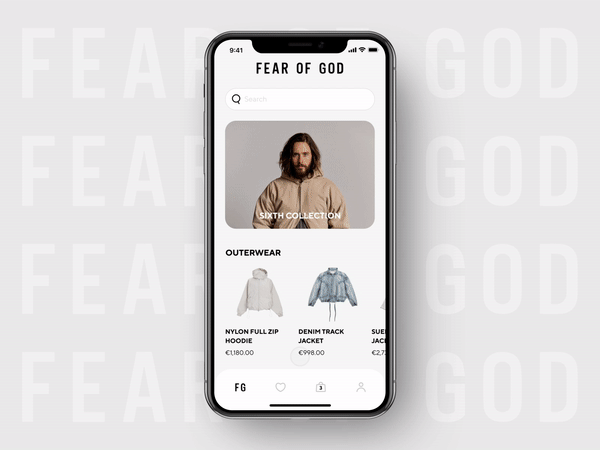
Fear Of God Fashion Store App Concept by Shakuro
The next question rises from the specificities of app development that we briefly covered in the section about tech stack. If you already have a working business and need a native application, an e-commerce mobile application is bound to take no less than 1000 hours, making the price of custom e-commerce app development to be about $40-50K, taking our outsourced rates.
If you don’t have a web store yet, then you could choose ready-made CMSs like WordPress, create a store in it, and then relatively quickly make an app out of it with the help of specific plugins or make a hybrid app. The price for building an e-commerce app of this kind is going to be several times less. There are a lot of options for any given project. Sometimes, the best decision is quite obvious, other times not so much.
* * *
The answer mainly depends on your budget and business goals. Ask yourself this question: How much do you think your profits will increase if you have an app? And compare this figure with an estimated e-commerce mobile app cost.
Feeling lost and confused? Get in touch for a detailed calculation of your project. The main asset of any e-commerce business is a highly optimized and well-designed online store. Our job as an e-commerce app development company is to help our clients flourish, finding new opportunities, whether web or mobile. The answer lies not in any particular technology, but in the best decision for a particular situation. We can find one for you too.
